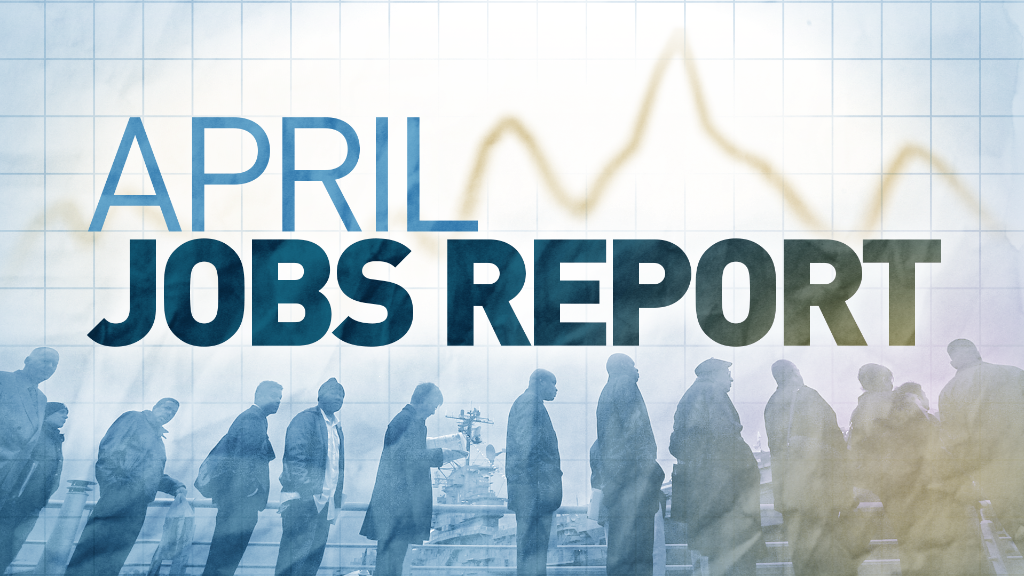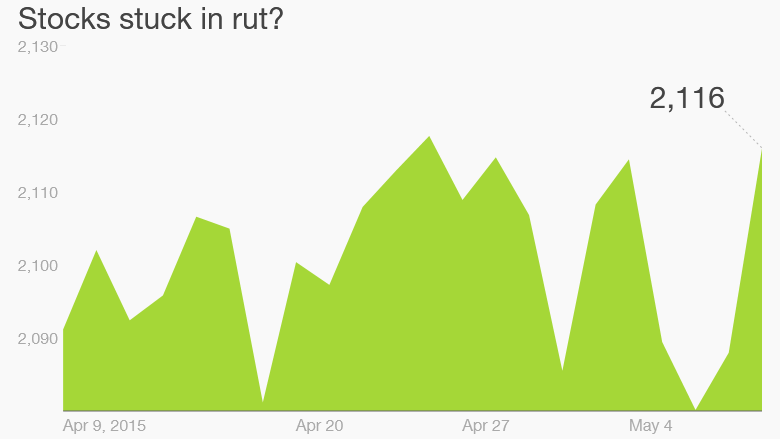
The stock market has been going up, up, up for basically six years. Now it's at a plateau.
Since March there's been a barrier preventing the market from rising any higher. The market gets close and then it falls back.
There's little debate among experts that stocks look pricey right now. Federal Reserve chair Janet Yellen doesn't usually comment on the stock market, but even she said last week that market valuations are "generally quite high."
Legendary investor Warren Buffett said the same thing to CNNMoney recently. He sees "very few" good stock buys now.
Related: Hedge fund star slams Warren Buffett
This is hardly news. Anyone who follows stocks knows that valuations -- especially so-called P/E ratios -- are higher than normal. It's to be expected given that last week the bull market became the third longest in U.S. history. Most people get tired on marathon runs. The bull market isn't that different.
But in the same breath, Yellen and Buffett and others are quick to point out that they don't see a bubble. This isn't 1999 or early 2000.
The wise minds seem to be saying the market is unlikely to tank in the coming weeks, but they aren't saying now is a great time to buy, either.
The easy money has been made. Now the discussion centers on what could push the stock market up even more despite the "high valuation" era we're in.

It will take more than a strong economy and solid corporate earnings to drive stocks forward from where they are now. Neither of those is certain.
Optimists point to the U.S. economy. Despite a lousy first quarter, America appears to be getting back on track this spring. On Friday, the Labor Department said 223,000 jobs were added in April. That was right in line with expectations and means the U.S. has been averaging over 200,000 job gains a month for the past half a year.
"[Friday's] jobs report was supportive of a continued market run...it's not too hot, it's not too cold, it's just right," says Brad McMillian, chief investment officer at Commonwealth Financial Network.
Related: Good news: U.S. economy adds 223,000 jobs
Earnings have been ho-hum. The earnings picture is more muted. While the first-quarter earnings season is turning out better than expected, that's largely because there were such gloomy expectations heading into it.
With 89% of S&P 500 companies having reported results, 71% beat Wall Street's earnings projections, according to Factset. This week a few more retailers -- Macy's (M), Ralph Lauren (RL) and Kohl's (KSS) -- will report.
But here's where it gets murky. It's a lot harder to beat on sales, and only 45% of S&P 500 companies that reported results so far managed to surpass Wall Street's sales forecasts, according to Factset. That's a lot lower than normal. In recent quarters, that figure is usually close to 60%.
With stocks so high, companies have to show growth to justify the top dollar valuations.
Related: Warren Buffett: No stock market bubble, but few bargains
The Fed factor: On top of that, the Federal Reserve is about to raise interest rates for the first time in about a decade. The Fed kept interest rates at historic lows to stimulate growth after the Great Recession, but the end of easy money days is coming.
Think of it like taking off the training wheels on a child's bike. No one is quite sure how that first ride or two will go. It could happen in September -- shortly after second-quarter earnings.
"Valuations don't matter until they do... A key factor makes them begin to matter, however, is when interest rates start to go up," wrote Peter Boockvar, chief market analyst at The Lindsey Group, in a note last week.
What to do: For older investors, the general advice is to talk to a financial adviser and consider positioning a portfolio more conservatively.
"If you're a moderate risk client who normally would be 60% stocks/40% bonds, maybe at some point you think about moving it down to 50/50," says McMillan.
For younger investors who can tolerate more risk, it's probably best to stick with mostly stocks, but be prepared for more market gyrations.
"People need to be thinking about markets in a different way," says Dan Farley, chief investment officer at State Street Global Advisors. "What has worked very well for the last couple of years of riding the QE [quantitative easing] train is not going to be the case as we go forward."
Yellen's surprise comments last week were meant to help re-align market expectations, although experts are quick to point out the former Fed chair Alan Greenspan tried to do something similar in 1996 and stocks kept going up for over three more years.
"In the short-term, I think market conditions are good, but the next correction is going to be a bad one," predicts McMillan.


